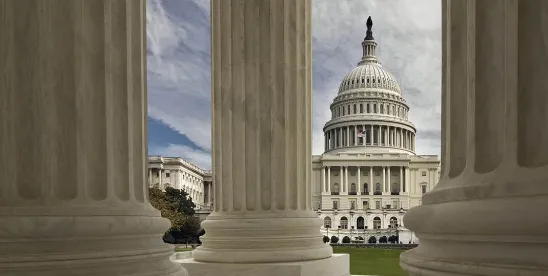The opening hours of the 119th Congress provided an interesting look at the two bodies of Congress, the United States House of Representatives (House) and the United States Senate (Senate), and offered a glimpse of what to expect from the leaders of those bodies during the next two years. While Republicans control the House and the Senate, their slim majorities will present challenges in legislating during the 119th Congress. In the House, it will take only a handful of Republican defections to threaten passage of any legislation that does not have Democratic support. In the Senate, Majority Leader Thune (R-SD) promised to retain the filibuster, meaning that any legislation pursued under regular order will require Democratic votes to proceed.
Starting with the “People’s House,” the first vote in the House each Congress is the vote to elect a Speaker of the House (Speaker). Unless and until a Speaker is elected, there are technically no members of Congress. Only after the Speaker is elected are the Representatives-elect sworn in and become Representatives. You may remember that in 2023, it took 15 ballots over four days (January 3 to January 7) to elect Kevin McCarthy (R-CA) Speaker of the House at the beginning of the 118th Congress.
We wrote in December 2024 that “Slim Majorities Will Test Republican Unity in the 119th Congress.” This is especially true in the House, where Republicans hold a 219-215 seat majority. (There are only 434 Representatives instead of 435. Representative-elect Matt Gaetz (R-FL) will not be seated in the 119th Congress.) It took less than two hours — and only one vote — the first vote of the 119th Congress, for cracks in the Republican caucus to appear for all to see. With the narrow majority, it would take only two Republicans to vote for someone other than the Republican candidate for Speaker to prevent election. Representative Thomas Massie (R-KY) already announced he would not vote for Representative Mike Johnson (R-LA) to be Speaker. Therefore, it would take only one more Republican to vote for someone else to prevent Johnson from becoming Speaker.
The vote was filled with drama as six Republicans did not vote during the roll call vote and three Republicans, including Massie, voted for someone other than Johnson for Speaker. When the non-voting members were called on again, they voted for Johnson, leaving only Representatives-elect Ralph Norman (R-SC) and Keith Self (R-TX) as the only other remaining holdouts standing between Johnson and the Speakership. Following private discussions off the floor of the House, Norman and Self returned to the House chamber and changed their votes to Johnson, giving him the requisite 218 votes to be elected Speaker of the House.
On the other side of Capitol Hill, the Senate convened at noon to begin the 119th Congress. Senator John Thune (R-SD), in his first speech as Majority Leader, said that he intends to preserve the legislative filibuster (“the Senate rule that today has perhaps the greatest impact in preserving the Founders’ vision of the Senate”) and restore the Senate as a “place of discussion and deliberation.” This means that Republicans will need Democratic support to enact legislation that is debated under “regular order,” which does not include budget reconciliation legislation, which requires only a majority vote to pass.
Thune also explained the Senate has an aggressive schedule — no recess (break) until mid-March 2025 — and much to accomplish, including an “overdue” Farm Bill, border security, extending the 2017 tax cuts enacted under President Trump, and other measures. The Senate also has the constitutional requirement to provide advice and consent on nominees of President-elect Trump.
Republicans plan to use a budget tool known as reconciliation to enact two packages of legislation, the first one focused on border, defense, and energy issues, the second on taxes (i.e., extending/expanding the 2017 tax cuts). As noted, reconciliation legislation is not subject to a filibuster; it requires only a majority vote to pass. (There are other limitations on the use of the budget reconciliation, which will be addressed in a later post.)
Senate confirmation hearings for Cabinet and other senior administration officials are expected to begin the week of January 13, with an early focus on national defense, international affairs, and homeland security positions so that Senate confirmation votes can be held as close to Inauguration Day as possible.
2025 Congressional Calendar
Based on the calendars provided by the leaders of the House and Senate, the First Session of the 119th Congress (2025) will be busier and in session for more days than the second session of the 118th Congress (2024). Counting the week that the 119th Congress convenes, the Senate will be in session for 39 weeks in 2025; the House for 35 weeks. You can view and download your own 2025 Congressional Calendar here.



 />i
/>i

